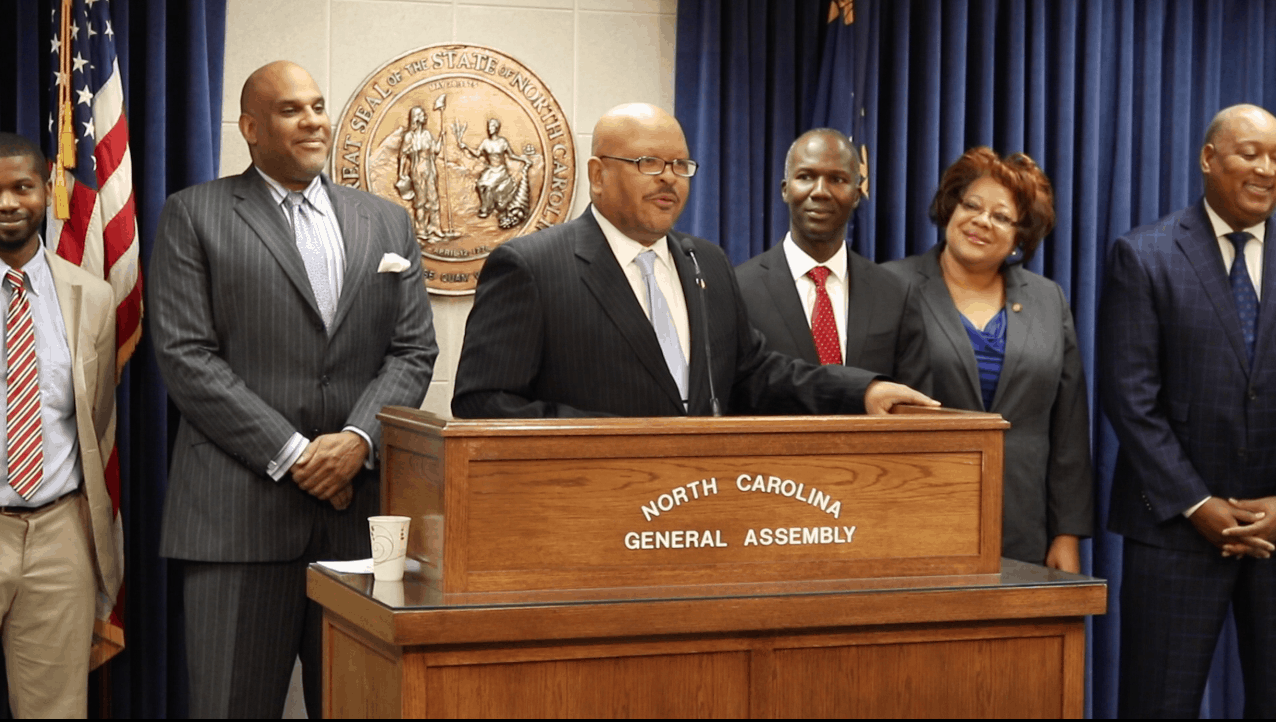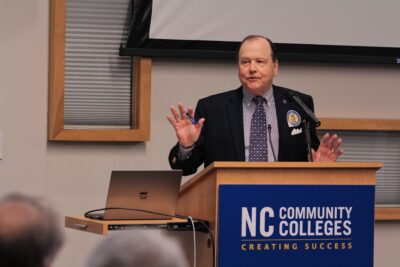Several African-American Democratic lawmakers announced their support for school choice Tuesday.
Although alternatives to traditional public schools have historically been promoted by Republicans, Rep. Rodney Moore, D-Mecklenburg, Rep. Edward Hanes, D-Forsyth, Sen. Erica Smith-Ingram, D-Bertie, and Sen. Ben Clark, D-Cumberland spoke of the importance of choice in bringing opportunities to disadvantaged students. Parents should be able to choose whatever environment leads to the success of their child, they said, including traditional public schools, charter public schools, private schools, and home schools.
“Make no mistake,” Moore said in a press conference, “the bedrock of strong communities starts with our schools, and we are here to ensure that every child — let me reiterate, every child — receives the best education possible regardless of his or her zip code or family income.”
Sen. Joel Ford, D-Mecklenburg, Rep. Elmer Floyd, D-Cumberland, Rep. Cecil Brockman, D-Guilford, and Rep. Kelly Alexander, D-Mecklenburg, also stood at the press conference. The coalition was backed by Parents for Educational Freedom in North Carolina (PEFNC).
Democrats have mostly, in the past, seen public charter schools as distractors of resources and attention from struggling traditional public schools. Smith-Ingram said that mindset needs to change.
“The challenge for us is to get away from the ‘either-or’ and set our hands and tasks to ‘both-and,'” she said. “I support traditional public schools, and I support public charter schools, and I support private schools.”
Opportunity scholarships, also known as vouchers, have been attacked in particular by public school advocates — especially on the Democratic side. In this program, public money helps pay for a child to go to a private school, which critics say are not held to the same standards as public schools.
Clark addressed this concern, saying he often hears people say they don’t want their taxpayer money going to a private institution.
“But what they fail to understand is those public dollars are going to educate children who are a part of our citizenry,” Clark said. “So again, the expenditure of public funds for a public cause is a great thing, and I can think of no greater cause than the education of our children.”
Charter schools have been found to be more segregated when it comes to minority students, particularly black students. But lawmakers Tuesday said they think more options for parents — a free market in education — can only be a positive for students.
Hanes specifically talked about the intense segregation in his district in Winston-Salem, where elementary schools are either almost entirely minority students from low-wealth backgrounds or mostly white from higher-wealth backgrounds.
He said third-grade literacy rates of high-poverty and high-minority schools are startling — ranging from 22 percent to around 7 or 8 percent.
“That is a 92 percent fail rate,” Hanes said. “I can not, in good conscious, look at any mother or father and tell them that they should be satisfied with that.”
Hanes said that’s why it’s time to look at other options for this generation of students.
“I think we are in a position now, as legislators, we’ve come to the point where we recognize that we need to think about thoughtful choice, which I think is what we’re doing,” Hanes said. “We need to approach this in an open manner and in a team concept.”
“But when we have failure rates like that in some of our public schools, that impact mostly students who look like the folks behind us, we have to take a stand on it,” he said.
PEFNC President Darrell Allison said he understands the deep ties that the African American community — especially the older generation — has to public schools. He said the pursuit of a better education for African Americans often meant attending a public school.
“Even when you look back at the 60s, it’s not so much that there’s an alliance to the traditional public school, it’s just that at that time, that was the better educational option for many families,” Allison said. “This new generation gets that. They’re not saying they’re against traditional public schools. These families just want a school that’s going to work for them.”
Watch Allison’s and the legislators’ complete remarks below.
Also at the legislature on Tuesday
The House K-12 Education Committee gave a favorable report to a bill (House Bill 87) that would require the State Board of Education to submit their Every Student Succeeds Act (ESSA) plan on the last possible date.
The federal legislation requires each state to build a plan within certain guidelines. With a new national administration and priorities, Rep. Jeffrey Elmore, R-Alleghany, said it’s best to wait and see what those final requirements are before submitting a plan that might be invalid.
Some lawmakers were confused as to why the timeline needed to be mandated when the State Board was already choosing to submit the plan on September 18 — the current last possible date.
Rep. Graig Meyer, D-Durham, said he didn’t want to interfere legislatively with a process the State Board has under control, especially while tension exists between the State Board, the State Superintendent, and the legislature.
“I believe that we have a State Board of Education for a reason and that we don’t need to micromanage their work,” Meyer said. “I’m not interested in passing a bill that micromanages their timeline on this when they have the authority from us and the expectation from the federal government to be the lead body in creating the plan and determining the best way to pursue the plan.”
Lou Fabrizio, the Department of Public Instruction’s director of data, research, and federal policy, noted that the plan goes into effect in the 2017-18 school year even though the U.S. Department of Education could take up to four months to review the plan after its initial submission in September.
“Although I think it is great that we have an opportunity to potentially delay submitting our plan, we have to remember that the U.S. Department (of Education) is then going to take…up to four months to approve those plans,” Fabrizio said. “And that would mean that the school systems are going to be sort of in that never-never land of, ‘What’s going to be happening?'”
One amendment was added to the bill by Rep. Hugh Blackwell, R-Burke, to make sure the state wouldn’t be required by law to submit the plan at such a late date that would cause penalization.





